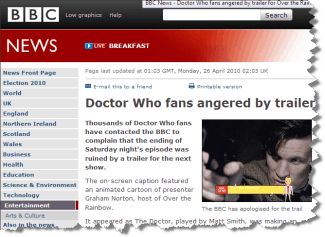 Fans of the hit TV series Dr Who are annoyed; no, they are furious. For two days the most popular story on the BBC News website has been about the anger of Dr Who fans who were annoyed by an on-screen trail for a Graham Norton programme. Like many TV broadcasters the BBC is following the notion that if you promote the next programme during the last minutes of the current show then people will stay glued to their sofas ready and waiting for the thrills to arrive on their screen. It is a false assumption, of course, like so much in the world of promotion and advertising.
Fans of the hit TV series Dr Who are annoyed; no, they are furious. For two days the most popular story on the BBC News website has been about the anger of Dr Who fans who were annoyed by an on-screen trail for a Graham Norton programme. Like many TV broadcasters the BBC is following the notion that if you promote the next programme during the last minutes of the current show then people will stay glued to their sofas ready and waiting for the thrills to arrive on their screen. It is a false assumption, of course, like so much in the world of promotion and advertising.
The assumption is two-fold. Firstly, it assumes that anyone watching Dr Who is also likely to want to watch a programme about a bunch of young women desperately trying to win the affections of Lord Lloyd Webber so they can get a place on the London stage. The second assumption is that the visual interruption will be acceptable.
Research consistently tells us that people do not like advertising. But it is not that they don’t like adverts. Rather, it is the way advertising is presented to us – as an interruption. All of our cognitive resources are busy helping us concentrate on what we are interested in. Then – bang – along comes something that grabs our attention, reduces our ability to concentrate on what we want and thereby reduces our brain’s potential for keeping track of things.
Advertising almost always interrupts our cognitive flow – and that’s the reason we dislike it so much. However, there are occasions when advertising does not interrupt us and when we like it. For instance, Ebay is nothing more than millions of pages of adverts, yet it is the 25th most popular website in the world with around 70m visitors each day. Similarly, the UK publication “Exchange & Mart” sells very well in printed form and is purely classified advertising. Craigslist is similar, but is merely a listing of classified advertising and it manages to attract 5m visitors each day. If we actually disliked advertising per se, these organisations would not succeed.
The point is, these sites are focused on what our brain wants to focus on at that moment in time – locating a suitable advertisement. When we are watching Dr Who – or any other TV programme for that matter – all our brain’s conscious resources are pooled together to help us become involved in the drama unfolding before us. Once that process is interrupted we get really annoyed – hence the outpouring of anger from the fans this weekend. Many of the people who watch Dr Who may well have gone on to see the “Dorothy” programme that was being trailed by the cartoon of Graham Norton. Indeed, there will be people who are fans of both programmes. It is the interruption to cognitive flow which is annoying, not the promotion itself.
Online, the same is true. Interrupt the thinking of your visitors and you will annoy them. That’s why online advertising fails to work; it is not that people are unwilling to click on adverts, rather they simply get annoyed by the interruption. Most online advertising fails to receive any click throughs – except the advertising on Ebay or Craigslist, for instance. Hence people are willing to look at online adverts; they are just not willing to do so when they want to do something else.
If you run a web business it means you need to think carefully about how you present your web pages. Adverts on those pages will annoy people. In fact, any kind of interruption will annoy people. It is all a reminder of the need to focus. Some of the most successful web pages in the world are a long advert, which scrolls down and down until you get to the point where you “buy now”. Equally, some of the most successful websites in the world, like the BBC News website, do not carry any advertising or interruptions. Presenting web pages without interruption is what is needed to boost the connections to your business. If you need to carry advertising or you want to promote your products, interrupting your readers will have less impact than presenting that material in isolation.
Annoying your website visitors with interruptions is a poor strategy. Focusing your material – whether it is editorial or advertising – is by far the best way to go.
Take note BBC – that’s what you used to do. In the past, you left the promotion of programmes to the “gaps” between shows. That worked. Interrupting your audience does not.
